When trusty milk bars ruled Melbourne’s suburbs
There was a time when Melburnians turned to their suburban milk bar for a litre of milk, sliced ham for school lunches or even a packet of cigarettes. But the introduction of some new players and trading laws forever changed the way we shopped.
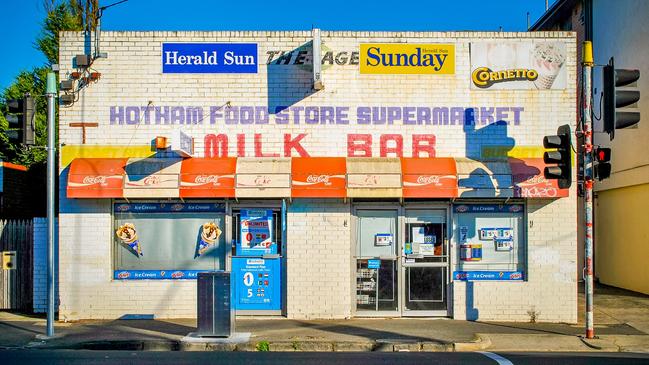
Leader
Don't miss out on the headlines from Leader . Followed categories will be added to My News.
As late as the ‘80s, you could have fired a cannon in the main street of any town or suburb in Victoria after 6pm most nights and after 1pm on Saturdays and you wouldn’t have hit a thing.
But the lights stayed on in milk bars across the state well into the night if you needed a litre of milk, some sliced ham for school lunches, a sneaky packet of biscuits for evening coffee or (gasp!) some cigarettes.
These were family-run retail beacons that cut through the darkness of early morning and late night when few other shops were open.
But their days were numbered when the Cain and Kennett government’s gradually relaxed trading laws and forever changed the way we shopped and lived.
Shoppers were once expected to go to multiple shops to fulfil their needs — the butcher, the greengrocer, the baker and the grocery shop — before supermarkets began to creep into the suburbs in the 1950s and ‘60s.
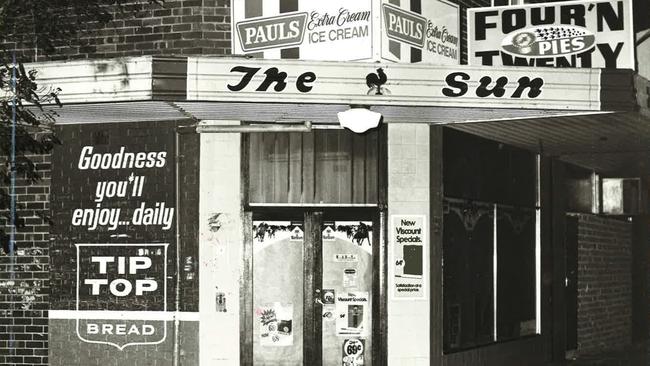
The corner store used to be the place to grab your groceries, with a huge range of tinned goods stacked high on shelves and bulk supplies of tea, flour, sugar, biscuits among many others ready for shoppers to select.
As supermarkets began to dominate household shopping, milk bars began to evolve.
By their heyday of the 1960s and ‘70s, milk bars were the first convenience stores — the places to go for emergency grocery items beyond normal trading hours.
A typical milk bar sold fresh dairy products, bread, the newspapers, ice-creams from Streets, Pauls and Peters, soft drinks including the Coca Cola Range, Pepsi, RC Cola, Schweppes and Tarax, and chocolates from Rowntree, Hoadley, MacRobertson, Cadbury and Fry’s, among others.
There was a cabinet full of individual sweets where kids would torture shopkeepers painstakingly filling big, white bags with 10 cents worth of Clinkers, jubes, Big Boy cigars, licorice and Jersey caramels, one lolly at a time.
You could by your swap cards — Scanlens VFL footy cards, anyone? — and there was a stand full of Susan Day Swiss rolls and fairy cakes in case company came around unexpectedly.


Tinned goods like baked beans, spaghetti and vegetables were still common.
You’d often find Milo, Ovaltine and a box or two of Bournville cocoa along with jam, honey, breakfast cereal, bread, flour, gravy powder, biscuits and very basic bathroom and cleaning items.
Milk bars usually had a deli fridge at the counter with a small selection of cold meats — ham, stras, mortadella and the like, with some cheese.
Behind the jump, you’d find a huge selection of cigarettes and tobacco — and no-one batted an eyelid if mum or dad sent you down to the shop with a note for a packet of Ardath or Escort.
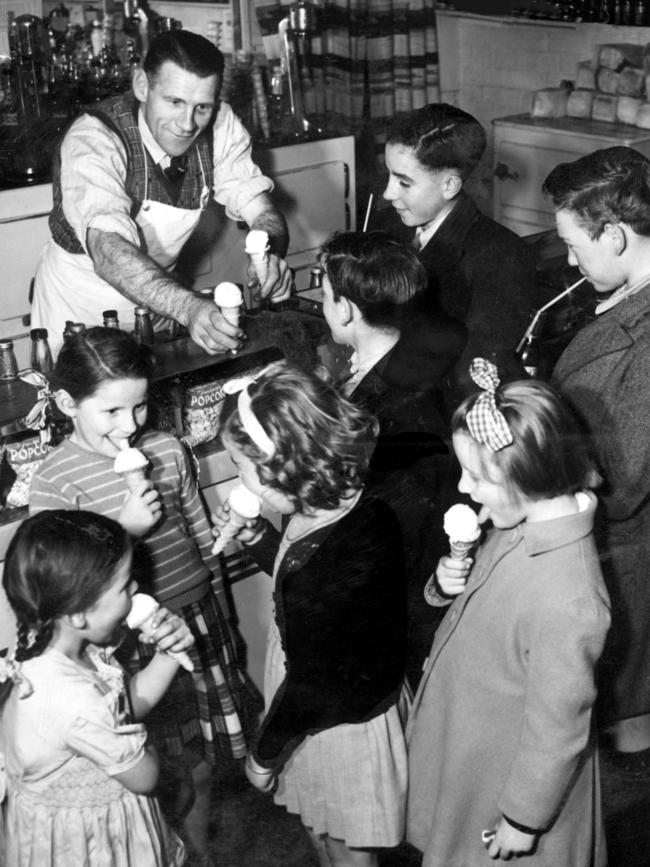
There’d be a meat slicer, a bench to make cut sandwiches (always on white bread), a well stocked pie oven and a milkshake maker with luridly-coloured flavours nearby.
These businesses were protected because, for many years, supermarkets were restricted to open from 9am to 5pm or 6pm on weekdays and 9am to 1pm Saturdays, with no Sunday trading.
But milk bars escaped restrictions on trading hours because they were family operations, often with a residence above or behind the shop.
Milk bars typically opened from 6 or 7 in the morning until 9pm — and that kept them competitive with supermarkets and allowed some owners to charge excruciating prices for those items we all run out of at the worst times.
Service stations weren’t subject to retail trading restrictions either, but the servo of the 1960s and ‘70s was more likely to stock fan belts than Fantales or any other grocery item.
But the laws that protected milk bars began crumbling in 1971.
In the first major rationalisation of retail trading laws in decades, the state government introduced “later night shopping” on Fridays in November that year, allowing traders to open until 9pm. This was extended to Thursday nights later in the ‘70s.
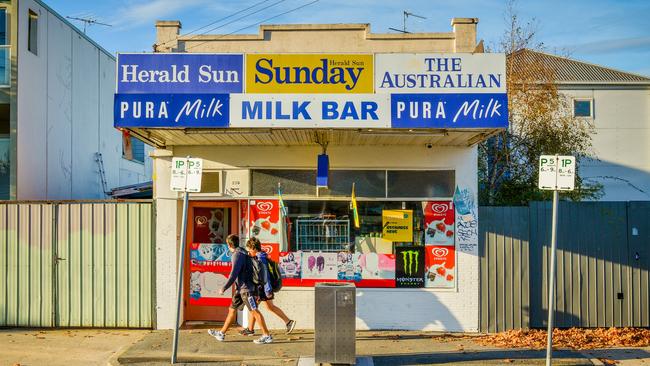
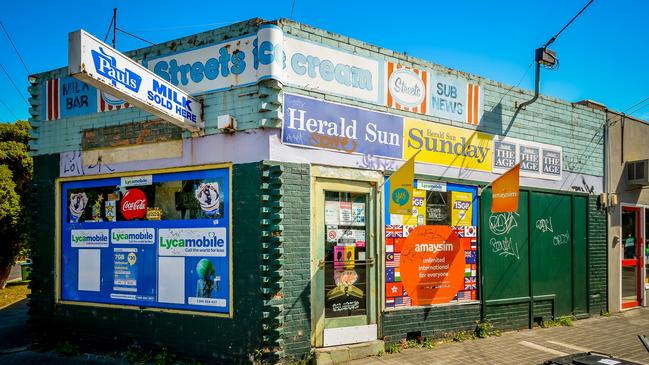
In August 1977, the first true convenience store arrived when the first Australian 7-Eleven opened in Warrigal Rd, Oakleigh, offering even longer opening hours than milk bars and, soon enough, 24-hour trade.
Its now defunct local rival, Food Plus, began operating soon after.
Soon, petrol stations were adopting the convenience store model. Milk bars were under the pump.
Public pressure was building for Saturday afternoon shopping. The old 9am to 1pm laws offered little chance for working people to shop for anything.
In Victoria, a Saturday afternoon trading association comprising many of the big retailers began agitating in 1981, ahead of the 1982 state election.
The move had long been opposed by unions wary of what such a change meant for members, and ultimately the retailers’ push failed.
But a Caulfield hardware shop proprietor, Frank Penhalluriack, put himself through the legal wringer and swung public sentiment in his favour.
Penhalluriack defied the law and began opening his shop on Saturday afternoons and Sundays in 1982, incurring crippling fines up to $500,000 and a total of 20 days in jail, which embarrassed the Cain government.
Under political pressure, it allowed Saturday afternoon retail trading and limited Sunday trading for some retailers in 1987.
By then, supermarkets were opening later on weekdays too, and traditional milk bars were on borrowed time.
Then, Sunday trading was introduced for 10 Sundays a year by the Kirner government in 1991. Shops in the CBD were allowed to trade on all Sundays in 1992, and under the Kennett
government, in 1993 shops in selected tourist areas were included too.
In 1994, the Coles-Myer and Woolworths groups began a full assault on the Kennett government, defying trading laws and opening many Coles, Woolworths, Safeway, Kmart and Big W outlets 24 hours a day and effectively daring the government to penalise them.
In 1996, the Kennett government relented and derestricted retail trading, but milk bars were already going to the wall before the big players won the war.
These days, a few supermarkets and the Kmarts at Campbellfield and Burwood East open 24 hours a day, and most supermarkets trade at least from 7am to 9pm, with many open from 6am until midnight.
There are still a few milk bars and corner stores in the suburbs and in country areas. Some have diversified to offer deep fried takeaway staples.
But for most of us, the days or popping down to the milk bar are long gone.
MORE VICTORIAN NOSTALGIA:
MELBOURNE’S FORGOTTEN FOOD FAVOURITES
WHEN A GANG OF AMPUTEE THUGS TERRORISED CITY
